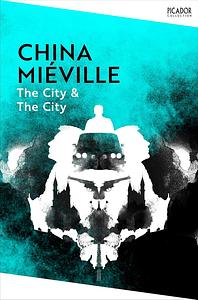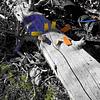You need to sign in or sign up before continuing.
Take a photo of a barcode or cover
I have often had the (admittedly unoriginal) thought that borders are artificial and really in our in heads. Mieville takes that to the extreme in this book where the physical borders are fuzzy, but the mental ones are more impenetrable than any wall.
I feel like reviewing this after my third reading, though it won't be a full review. I read this following another book that earned a new weird designation, and so I was in a very different frame of mind than the previous readings, I was thinking about this as new weird--in part using a chart that may or may not be a good definition of what new weird is, and almost certainly isn't worth referring to.
My first thought is that, according to the flow chart, the City and the City isn't new weird because the weird stuff, the way the two cities share geography but are separated in the mind, is assumed. As I say, according to the chart, it's not Weird. Except, then I got to the final section, where Tyador enters breach, and the book fits better the defintion of Weird (now that I want to value that too much), but it shows it's brilliance. Because Breach is far more like any city I've lived in than Beszel or Ul Qoma. And yet it is made to feel incredibly weird, far weirder than living in either of the two cities, which lets Mieville make his points about how we ignore what we want to ignore in a city (e.g. the homeless) brilliantly. Because we are shown how weird it is to see everything, to ignore nothing, to do what we'd like to tell ourselves we do as we move about a place.
My first thought is that, according to the flow chart, the City and the City isn't new weird because the weird stuff, the way the two cities share geography but are separated in the mind, is assumed. As I say, according to the chart, it's not Weird. Except, then I got to the final section, where Tyador enters breach, and the book fits better the defintion of Weird (now that I want to value that too much), but it shows it's brilliance. Because Breach is far more like any city I've lived in than Beszel or Ul Qoma. And yet it is made to feel incredibly weird, far weirder than living in either of the two cities, which lets Mieville make his points about how we ignore what we want to ignore in a city (e.g. the homeless) brilliantly. Because we are shown how weird it is to see everything, to ignore nothing, to do what we'd like to tell ourselves we do as we move about a place.
I don't remember quite when I read this (at least 5 years ago I think), but I know EXACTLY how this book made (makes) me feel: amazed, astonished, impressed, utterly fascinated.
Miéville manages to not only devise a totally compelling and original premise—a city divided by two cultures that refuse to see each other—but makes it absolutely believable. The residents of this imaginary Eastern European city inherit twin cultural traditions of not acknowledging the existence of the other culture—and thus, the other city, each overlaid carefully into the other. As with all emergent cultural phenomena, this is managed by large sets of small rituals: don't make eye contact. Don't look at signs or focus on the people themselves. Don't see them—and, therefore, don't know them, don't befriend them, don't speak to them.
At first, your intuitive reaction is something like, "Huh, well, I don't believe it, but it's spec-fic, so I'll suspend my disbelief." But quickly you are convinced that this could really happen, because ultimately it is a book about the incredible and terrifying power of human cultures to invent and force incredible and terrifying behavior.
Onto this setting is traced something of a mystery/detective novel, but the actual plot is what I remember the least. I remember that it is well tied into and driven by the cultural concepts, as it must be to be a working novel. I remember that the world-building is exquisitely detailed and, again, absolutely realistic.
Mostly I remember that the central mystery is that of the storied, legendary (and possibly apocryphal) enforcers of these cultural rules. This mystery develops a strange, compelling air of science fiction, as it is unclear what is real and what is just the cultural stories.
However, as with many of the best mysteries, when it is revealed in the last act (or second to last, depending on how you count it), it sucked the air out of it for me. This is my only disappointment with this book: the vague hints of what happens when you break the rules are so curious and exciting (do they have some strange powers? are they physical? Is it aliens or something?), that the truth could never live up. The reveal felt disappointing to me, mundane to some extent, even though the narrative logic makes overall sense.
But do not let that deter you. This is an incredible work of fiction that probes fundamental human behavior and is one of the most compelling commentaries on human culture that I've come across. Indeed, in the course of writing this review, I have already decided that I will re-read it.
Miéville manages to not only devise a totally compelling and original premise—a city divided by two cultures that refuse to see each other—but makes it absolutely believable. The residents of this imaginary Eastern European city inherit twin cultural traditions of not acknowledging the existence of the other culture—and thus, the other city, each overlaid carefully into the other. As with all emergent cultural phenomena, this is managed by large sets of small rituals: don't make eye contact. Don't look at signs or focus on the people themselves. Don't see them—and, therefore, don't know them, don't befriend them, don't speak to them.
At first, your intuitive reaction is something like, "Huh, well, I don't believe it, but it's spec-fic, so I'll suspend my disbelief." But quickly you are convinced that this could really happen, because ultimately it is a book about the incredible and terrifying power of human cultures to invent and force incredible and terrifying behavior.
Onto this setting is traced something of a mystery/detective novel, but the actual plot is what I remember the least. I remember that it is well tied into and driven by the cultural concepts, as it must be to be a working novel. I remember that the world-building is exquisitely detailed and, again, absolutely realistic.
Mostly I remember that the central mystery is that of the storied, legendary (and possibly apocryphal) enforcers of these cultural rules. This mystery develops a strange, compelling air of science fiction, as it is unclear what is real and what is just the cultural stories.
However, as with many of the best mysteries, when it is revealed in the last act (or second to last, depending on how you count it), it sucked the air out of it for me. This is my only disappointment with this book: the vague hints of what happens when you break the rules are so curious and exciting (do they have some strange powers? are they physical? Is it aliens or something?), that the truth could never live up. The reveal felt disappointing to me, mundane to some extent, even though the narrative logic makes overall sense.
But do not let that deter you. This is an incredible work of fiction that probes fundamental human behavior and is one of the most compelling commentaries on human culture that I've come across. Indeed, in the course of writing this review, I have already decided that I will re-read it.
adventurous
mysterious
reflective
medium-paced
Plot or Character Driven:
Plot
Strong character development:
No
Loveable characters:
No
Diverse cast of characters:
Complicated
Flaws of characters a main focus:
Complicated
Hugo award winner. Great premise.
adventurous
challenging
mysterious
reflective
medium-paced
Plot or Character Driven:
Plot
Strong character development:
No
Loveable characters:
Yes
Diverse cast of characters:
Complicated
Flaws of characters a main focus:
No
adventurous
dark
mysterious
reflective
tense
fast-paced
Plot or Character Driven:
Plot
Strong character development:
Complicated
Loveable characters:
Yes
Diverse cast of characters:
No
Flaws of characters a main focus:
No
Plot or Character Driven:
Plot
Strong character development:
No
Loveable characters:
Complicated
Flaws of characters a main focus:
Complicated
challenging
mysterious
medium-paced
Plot or Character Driven:
Plot
Strong character development:
Complicated
Loveable characters:
Complicated
adventurous
mysterious
tense
fast-paced
Plot or Character Driven:
Plot
Strong character development:
No
Loveable characters:
No
Diverse cast of characters:
Yes
Flaws of characters a main focus:
No

